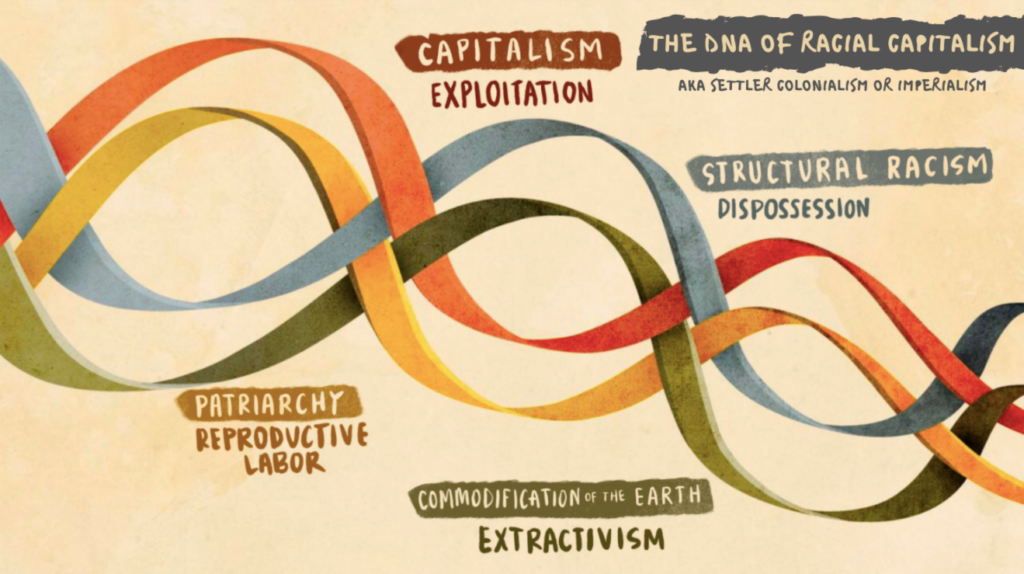OUR ANALYSIS OF SOCIETY TODAY
Racial Capitalism and Neoliberalism Are Dominant Structures Shaping Society Today
To advance racial, economic, gender and environmental justice, we must address the underlying structures that shape everyday life. These include:
- Racial capitalism: Our current economic system, which prioritizes profit over all else and in which racism and sexism are structuring forces.
- Neoliberalism: the current manifestation of racial capitalism, which for the past fifty years has shaped our economy so that it serves the interests of the wealthy few
Neoliberalism Has Created The Conditions For A Resurgence Of White Nationalism
Decades of neoliberalism have led to a decline in quality of life and economic conditions for everyday people. The new, emerging form of nationalism uses a racist bullhorn to rally support among white working and middle classes, while furthering corporate profiteering. This has created a popular base for white nationalism and emboldened a strong far-right movement.

OUR THEORY OF POWER
We Need Structural Transformation
We need a new political project that undoes the damage of neoliberalism, overcomes white nationalism and transforms the underlying structures of racial capitalism. This kind of structural transformation entails “structural reforms” that transfer wealth and decision-making power away from profit-making entities (corporations, big banks, the 1%) towards people’s institutions, while making governing institutions more responsive and democratic.
We Need Mass Popular Power for Structural Transformation
We need a “Bigger We” that can exercise mass expressions of power in all spaces – our communities, government, media and the ballot box. We must affirm our shared interest in transforming the structures that create and perpetuate race, class, gender and climate injustices. We can create more political possibilities by building common cause across all poor and working people.
We Need To Build Governing Power
To achieve structural transformation, we must increase our governing power. Governing power is the power to design, legislate, implement and enforce a structural reform agenda and to defend those reforms until they can defend themselves. It requires not just electoral or legislative power, but also administrative and policy-making, power to shape the narrative, and increased organizational and movement infrastructure to align and drive a shared agenda. For more, see our paper on Governing Power.
We Must Shift Old Approaches To Organizing
For too long, the field of organizing has been constrained by short-term thinking, siloed into separate organizations and issue areas. We have been hesitant to articulate a worldview and ideology that helps everyday people make sense of the conditions around them. Instead of holding governance positions ourselves, we have been content to lobby the powerful. Instead of advancing a long-term agenda for change, we have focused on immediate gains that do not challenge the current organization of wealth and power.
We Must Nourish New Strategies
New approaches to organizing and power-building are emerging across the country, led by organizers who are able to engage simultaneously in both long-term, strategic practice and the more immediate and necessary work of short-term organizing. New leadership – often younger and majority women and people of color – are integrating feminist and racial justice frameworks together with critiques of economic inequality. GPP supports and nurtures this emerging orientation to social change work.